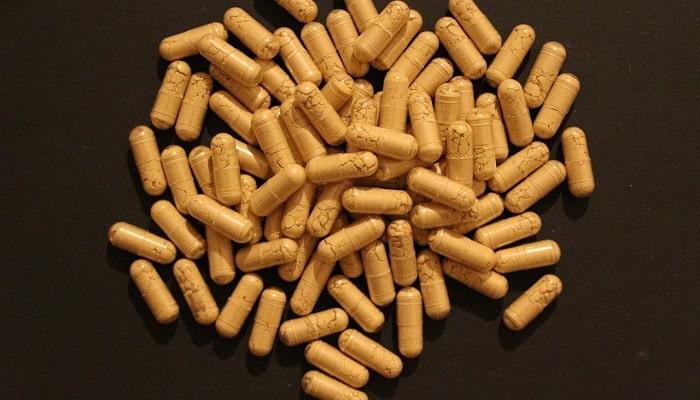Belly bloat. An uncomfortable symptom that can leave you with a round, swollen belly… making it so you don’t look or feel like yourself.
If you get bloated more often than after the occasional large meal or holiday feast, it might be time to look deeper into the issue and find ways to better support your body so that you can prevent and relieve your bloating.
Let’s explore what bloating is, what causes it, the top supplements for bloating, and other tips to reduce this uncomfortable symptom.
What is bloating?
Bloating is a symptom where you feel a sense of fullness and tightness in the upper abdomen. With bloating, you may have a distended belly (meaning it appears swollen or inflated), and you may also have pain or discomfort.1 2
Bloating most often occurs when there is a buildup of gas or food in the digestive tract. So it is common to also experience excess gas or constipation when you get bloated.
What causes bloating?
Many people associate bloating with having eaten too much food and usually occurring after big meals. But that isn’t the only reason why you can experience bloating.
Some of the various causes of bloating can include:
- The longer stool stays in the colon, the more time bacteria have to ferment it—which can cause excess gas and bloating.
- Imbalance of bacteria. Bacteria produce gas in the digestive tract. So if there is a disruption in normal bacteria balance, such as with a disorder called small intestinal bacterial overgrowth (SIBO), you may get bloated.
- Eating too much or not enough fiber. Too much fiber can overload your system and cause excess gas and bloating. Too little fiber can also make you constipated, which can result in bloating as well.
- If you aren’t drinking enough water, your food won’t be able to move as smoothly through the digestive tract and you may end up with constipation and bloating.
- Swallowing too much air. Drinking from straws, chewing gum, and other habits can lead you to swallow excess air, creating gas and bloating in your belly.
- Food intolerances. If you are sensitive to certain foods, you may experience gastrointestinal symptoms like bloating when you eat those foods. Bloating is a common symptom of lactose intolerance, for example, so many people get it when they eat dairy products.
- Various health problems. Digestive issues, such as irritable bowel syndrome (IBS) and gastroparesis, can all lead to bloating. Bloating can also be a symptom of other issues like gynecological-related concerns.1 2 3 4
Top 6 supplements for bloating
One way to help reduce bloating is to support your body with nutritional supplements that can help bring things back into balance. Here are some of the top supplements for bloating that can help you find relief:
1. Probiotics

One of the common causes of bloating is an imbalance of gut bacteria. Many experts believe that modifying the population of bacteria in the gut through probiotic supplementation can improve bloating and other GI symptoms.4
Several studies have found probiotic supplements to help with a variety of digestive symptoms related to IBS, including bloating.5 6 So it may be worth your while to try adding more of these friendly probiotic bacteria to your diet.
Along with taking a high-quality probiotic supplement, eating fermented foods might also be a good idea. Foods that are fermented using traditional methods are a natural source of friendly probiotic bacteria. Try fresh sauerkraut, kimchi, kefir, miso, and more.
2. Digestive enzymes
If your bloating is due to a problem absorbing or breaking down certain components of your food, then digestive enzymes may be able to help you out. Digestive enzymes are supplements that help you to break down various proteins, carbohydrates, or lipids from your food that your body may have a hard time digesting on its own.
Research suggests that digestive enzyme supplements can be helpful for relieving various digestive concerns and symptoms.7 For example, digestive enzymes that aid the body in breaking down lactose can be helpful for people with lactose intolerance (a disorder where you aren’t able to properly digest lactose in dairy products).
3. Vitamin D
If your bloating is related to an issue like IBS, vitamin D has shown to be quite effective as a nutritional supplement. Researchers believe that people with IBS tend to have low levels of vitamin D, and that vitamin D supplementation may help to ease symptoms like bloating.8
Along with supporting digestion, vitamin D also has many other important benefits in the body, so it is well worth your while to make sure you are getting plenty of this vital nutrient. Check with your doctor, who can help you to assess your current vitamin D levels and then decide on an appropriate dose to help you maintain proper levels.
4. Ginger

Ginger has been used for thousands of years as a remedy for a variety of ailments. One of the most common uses of ginger is for digestive symptoms and concerns—including bloating.9
Ginger has been shown in studies to stimulate the speed at which the stomach empties food, which may be helpful for reducing bloating.10 It is also known to have anti-inflammatory and antioxidant properties, and has many other beneficial effects in the body as well.9
Ginger can be taken in capsules, but it can also be found in forms like chews or teas. Or, you can simply try adding more fresh ginger root or ground ginger to your cooking!
5. Peppermint
Peppermint is another natural herb that has many beneficial effects for digestive health. Studies have found peppermint oil to be safe and effective for easing symptoms of IBS, for example.11 It works by helping the muscles of the digestive tract to relax, which can help relieve uncomfortable things like stomach cramps and bloating.12
Peppermint oil can be found as a supplement in capsule form. You can also choose to drink peppermint tea for relief from digestive discomfort when you aren’t feeling well.
6. Psyllium husk
If constipation is the root of your bloating, increasing your fiber intake is one of your best bets to keep your digestion flowing smoothly.3 13 If you have trouble getting enough fiber in your diet through foods like veggies and whole grains, you can keep things moving along with the help of a fiber supplement.
That’s where psyllium husk comes along. It’s a natural source of fiber that can help to prevent constipation, so you don’t end up with that uncomfortable bloat.14
Be sure to start slowly with any fiber supplement, including psyllium fiber, as it can actually trigger gas and bloating at first while your body adjusts to the new normal.
Make sure to also drink plenty of water alongside the fiber. Fiber and fluid work together to keep digestion running well, so stay hydrated!
Additional tips to reduce bloating

Aside from supplements, there are many other things you can do to support your body and reduce bloating. For a holistic approach to finding relief from bloating, give these tips a try:
- Don’t eat too quickly or overeat. Bringing more intention and awareness to your eating habits can help out a lot. Eat slowly, and eat smaller amounts at a time. This can help to take some pressure off of your gastrointestinal system, allowing it ample time to digest your food and eliminate it before a backup occurs.1 13 Drink plenty of water and stay hydrated. Keeping yourself well hydrated will help move digestion right along to prevent constipation and the bloating that can come along with it.
- Exercise regularly. Research suggests that physical activity can help to clear gas in people with bloating.2 15 Plus, it helps promote overall health and well-being, allowing you to feel your best!
- Incorporate more fiber into your diet over time. Avoiding constipation is one of the best things you can do to prevent bloating. Slowly and gradually increasing your fiber intake—so as to not overload your system at first—can help to create healthy flow in your digestive tract so that you can ease your symptoms.13
- Consider a low FODMAP diet. FODMAP refers to fermentable oligosaccharides, disaccharides, monosaccharides, and polyols. These are specific types of carbohydrates that aren’t absorbed well by the small intestine and that can create high levels of gas. Foods high in FODMAPs are associated with IBS symptoms like bloating, and eating less of them can often help. A low FODMAP diet removes foods like wheat, onions, garlic, legumes, beans, dairy, apples, pears, apricots, sweeteners, broccoli, cherries, cauliflower, mushrooms, and more.2 3 4 16
- Avoid carbonated drinks. Carbonation just adds more gas to your digestive tract, which can exacerbate the problem.13
- Keep a food diary. Start to take note of what you eat and how you feel afterwards, so that you can track your reaction to certain foods. This may help you to identify any foods you may be sensitive to and that could be removed from your diet to help ease your bloating.
Key takeaways
Bloating is a very uncomfortable symptom that doesn’t leave you feeling like yourself. If bloating is a regular experience for you, it may be time to try out a few different options to find relief.
There are several supplements for bloating that you can try that may help to address some of the root causes of your bloating, such as probiotics, digestive enzymes, vitamin D, ginger, peppermint, and psyllium husk fiber.
Make sure to discuss with your doctor before adding any new supplements to your routine. The use of any herbs or supplements, even natural ones, should always be overseen by a qualified healthcare provider.
And don’t forget to take a look at your diet and lifestyle, too! Careful food choices, mindful eating, regular exercise, and more can all do wonders when it comes to preventing and relieving bloating.
 About Brittany Lubeck
About Brittany Lubeck
Brittany Lubeck is a registered dietitian and nutrition writer. She has a Bachelor of Science in Dietetics, a Master of Science in Clinical Nutrition, and began her career as a clinical dietitian. Brittany has always enjoyed research and loves that she can help people learn more about nutrition through her writing.
Sources:
1. “Belching, Bloating, and Flatulence.” American College of Gastroenterology. Gi.org.
2. “How to Beat the Bloat.” Northwestern Medicine. NM.org.
3. “Bloating: Causes and Prevention Tips.” The Johns Hopkins University, The Johns Hopkins Hospital, and Johns Hopkins Health System. Hopkinsmedicine.org.
4. Hungin, A.P.S., C. Mulligan, et al. “Systematic review: probiotics in the management of lower gastrointestinal symptoms in clinical practice – an evidence-based international guide.” Alimentary Pharmacology and Therapeutics 38, no. 3 (2013): 864-886.
5. Dale, H.F., S.H. Rasmussen, et al. “Probiotics in Irritable Bowel Syndrome: An Up-to-Date Systematic Review.” Nutrients 11, no. 9 (2019): 2048.
6. Hungin, A., C.R. Mitchell, P. Whorwell, et al. (2018). “Systematic review: probiotics in the management of lower gastrointestinal symptoms – an updated evidence-based international consensus.” Alimentary Pharmacology & Therapeutics 47, no. 8 (2018): 1054–1070.
7. Soni, N.K., H.H. Trevidi, et al. “A Review of Digestive Enzyme and Probiotic Supplementation for Functional Gastrointestinal Disorders.” The Indian Practitioner 73, no. 3 (2020): 35-39.
8. Williams, C.E., E.A. Williams, & B.M. Corfe. “Vitamin D status in irritable bowel syndrome and the impact of supplementation on symptoms: what do we know and what do we need to know?” European Journal of Clinical Nutrition 72, no. 10 (2018): 1358–1363.
9. Nikkhah Bodagh, M., I. Maleki, & A. Hekmatdoost. “Ginger in gastrointestinal disorders: A systematic review of clinical trials.” Food Science & Nutrition 7, no. 1 (2018): 96–108.
10. Hu, M.L., C.K. Rayner, et al. “Effect of ginger on gastric motility and symptoms of functional dyspepsia.” World Journal of Gastroenterology 17, no. 1 (2011): 105–110.
11. Pittler, M.H., & E. Ernst. “Peppermint Oil for Irritable Bowel Syndrome: A Critical Review and Metaanalysis.” The American Journal of Gastroenterology 93, no. 7 (1998): 1131-1135.
12. “Peppermint oil.” Crown. Nhs.uk
13. “Foods That Help Reduce Bloating.” Cleveland Clinic. Health.clevelandclinic.org.
14. El-Salhy, M., S.O. Ystad, et al. “Dietary fiber in irritable bowel syndrome (Review).” International Journal of Molecular Medicine 40, no. 3 (2017): 607–613.
15. Villoria, A., J. Serra, et al. Physical activity and intestinal gas clearance in patients with bloating.” The American Journal of Gastroenterology 101, no. 11 (2006): 2552–2557.
16. “Try a FODMAPs diet to manage irritable bowel syndrome.” The President and Fellows of Harvard College. Health.harvard.edu.